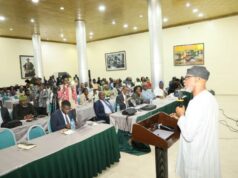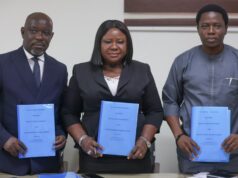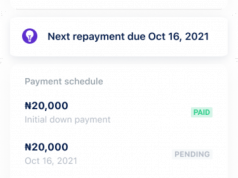…WHO is coordinating health sector partners to target 5.1 million people for humanitarian health interventions in the region.
FRI, MAY 24 2019-theG&BJournal-It started like every other normal day. Mallam Isah and his wife, Hauwa, had set off to the farm as it was the peak of the farming season. Half way into the day’s work, the attention of the couple was needed back home. Bintu, their 3-year old daughter had high fever with rashes around the neck and eyes.
The nearest healthcare centre, Babangida clinic was attacked in 2014 by insurgents. Since then, more than 23,000 inhabitants have difficulties accessing health care services.
“We trekked no less than 12 kilometres to reach this outreach centre, says Mallam Isah. “Thank God, the outreach session is working in our community today. My daughter would have suffered from treatable illness. Since the insurgents attacked this community, the health clinic has not offered services. We have to travel more than 12 kilometres to access healthcare, resort to unorthodox medication or hope for recovery without medication. Sometimes, we suffer needlessly from treatable ailments. Today, I am happy that this health clinic is being renovated for improved services. Thanks to WHO.”
As part of the efforts to strengthen the weakened healthcare system in the north-east, the World Health Organization (WHO) is rehabilitating with funding support from the European Union and Global Affairs Canada, 23 selected health facilities in Borno, Adamawa and Yobe states. This will enhance healthcare service delivery that could benefit up to 150,000 people in the affected states.
“Strengthening the healthcare system is a top priority of WHO’s health emergency response in the north-east Nigeria,” says Dr Clement Peter, WHO Officer in Charge. According to him, “WHO is embarking on building the capacity of human resource for health, structural rehabilitation and provision of equipment to strengthen healthcare delivery in the north-east Nigeria where insurgency had devastated services for a decade.”
Out of the 23 health facilities to be rehabilitated, nine will undergo comprehensive structural renovation: four primary healthcare facility in Yobe, four in Adamawa and one secondary healthcare facility in Borno. This entails structural rehabilitation and renovation of the health, sanitary facilities and provision of equipment, drugs and medical supplies.
Most of the health facilities are either partially destroyed by insurgents or over-stretched as a result of population displacements in the north-east region,” Dr Collins Owili, WHO Emergency Manager in the north-east disclosed.
“In Yobe state, for example, the Kukar Gadu Primary Health Centre, hitherto, had the capacity to provide healthcare services for more than 11,000 persons, but due to recent population displacement, the facility had to cater for more than 21,000 persons including internally displaced persons currently living in Kukar Gadu community,” said Dr. Owili.
After the implementation of the WHO intervention, the capacity of the Kukar Gadu centre will be increased enabling more than 20,000 persons to have access to adequate medical treatment.
The rehabilitated health facilities will contribute to providing comprehensive care of children’s health, reproductive health, and treatment of severe and moderately acute malnutrition cases in addition to vaccination.
“Prior to the population surge, my family and I received regular comprehensive healthcare services at the Kukar Gadu health clinic,” said Mohammed Aminu, Kukar Gadu community leader. “But since our people were displaced from Damaturu and neighboring communities, we have hardly had enough medications and services and many of us are suffering from treatable ailments due to lack of medicines.”
Through this rehabilitation initiative, WHO will enable people in need in Borno, Adamawa and Yobe to have access to good health care services. “We are grateful to WHO, the European Union and Global Affairs Canada for their contribution to improving access to health care services for our communities” said Yusuf Abdulahi, Officer-in-charge of the health facility.
“This primary health care centre was in very poor condition before the project. We could not provide adequate care our patients needed and deserved. As a healthcare worker, this was a challenging experience seeing people in need but not having the means to help them. The rehabilitation was very important. Now, we have a functional centre and I can proudly take care of my patients,” he added.
According to recent WHO assessment on the availability of health resources in the north-east region, 46% of health facilities are either fully destroyed or damaged in Borno, Adamawa and Yobe states where nearly two million women are at reproductive age and 1.6 million men are sexually active.
Consequently, populations in need of healthcare services, especially women and children, are either underserved or suffer from avoidable and treatable health conditions. The north eastern states have the worst indices of maternal and child health in Nigeria. Endemic malaria still accounts for more than 50% of mortality and morbidity among children with acute respiratory tract infection, watery diarrhea and severe acute malnutrition as leading causes of illness.
In 2018, WHO reached more than three million people with basic healthcare services including those in hard-to-reach locations across Borno, Adamawa and Yobe States. In 2019, WHO is coordinating health sector partners to target 5.1 million people for humanitarian health interventions in the region.
|twitter:@theGBJournal|email: info@govandbusinessjournal.com.ng|









